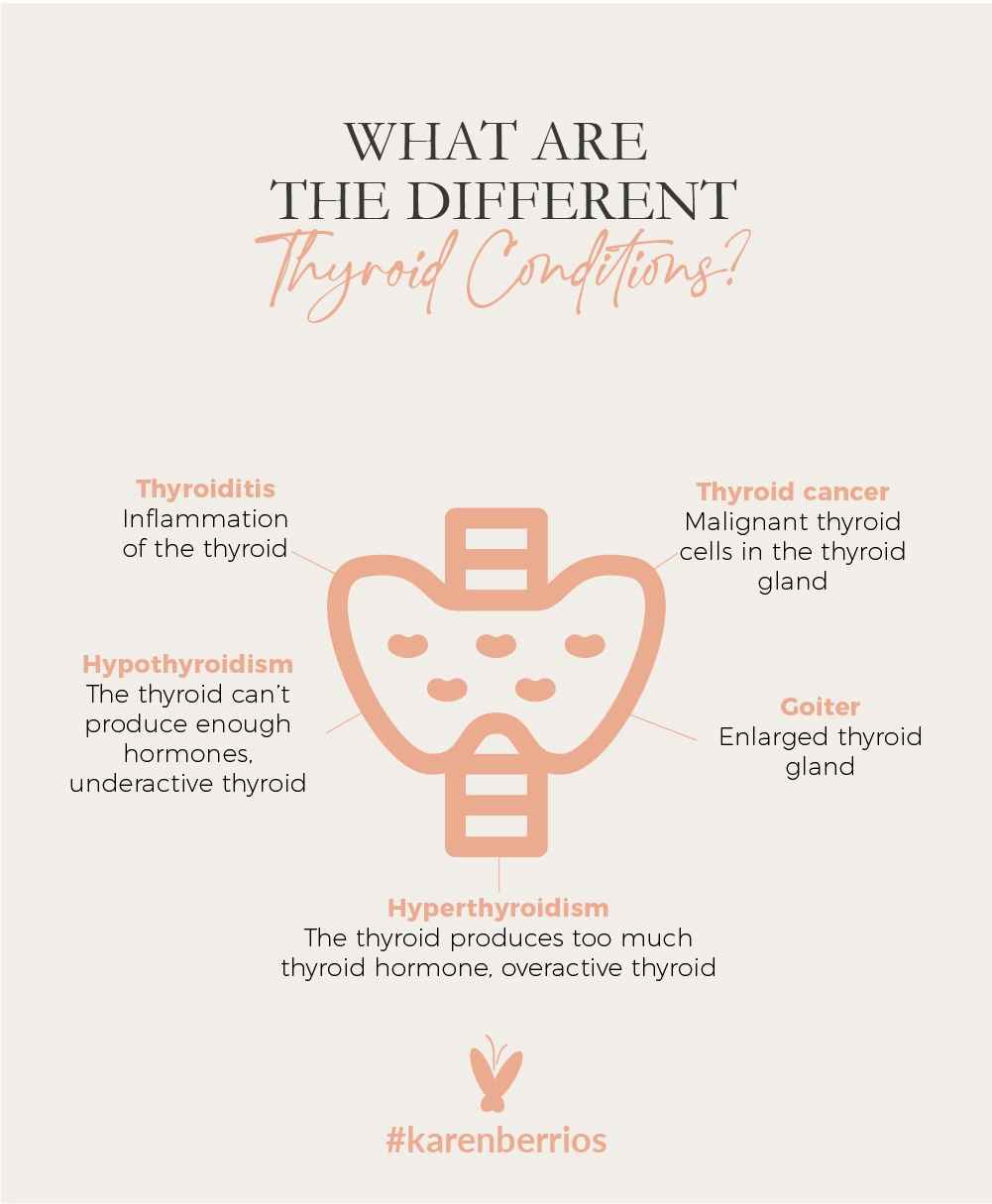

What are the Different Thyroid Conditions?
Different Thyroid Conditions. The thyroid is a powerful gland, located in the neck, just below the Adam’s apple. It’s responsible for a variety of important processes in the human body, from regulating your body temperature to regulating your metabolism. Unfortunately, with the crazy busy, stressful, and overwhelming lives we all lead, its function can easily get impaired, causing many different thyroid conditions that can severely impact our overall health and longevity.
Our food, water, air, and even our lifestyle choices – they all have a drastic impact on the thyroid and whether or not it will be able to perform its role in an optimal way. Luckily, there are ways to deal with, manage, and in most cases, prevent these thyroid conditions from wreaking havoc on your entire system.
The Main Role of the Thyroid
The thyroid has the important job of producing and secreting hormones that regulate the body’s metabolism, which is our main process of converting food into energy. The thyroid gland produces two main hormones: thyroxine (T4) and triiodothyronine (T3), which are released into the bloodstream and travel to every cell in the body. There, these important hormones play a crucial role in controlling the rate at which cells use energy.
But, it’s not as simple as it sounds. The thyroid gland is controlled by the pituitary gland, which is located at the base of the brain. The pituitary gland is the so-called master gland as it governs many different areas of the body. For thyroid function, it secretes the thyroid-stimulating hormone (TSH), which stimulates the thyroid gland to produce and release its hormones.
If the thyroid gland is not functioning properly, it can lead to a range of conditions, including hypothyroidism (underactive thyroid), hyperthyroidism (overactive thyroid), thyroid cancer, and more. Symptoms of thyroid disorders can vary drastically, and include everything from fatigue, weight changes, mood swings, and changes in heart rate, to immune issues, gut problems, and even mental health issues. Treatment for thyroid disorders depends on the underlying cause and may involve medication, surgery, or radiation therapy.
Most Common Thyroid Conditions
With so many different causes and conditions that can impact the thyroid and cause it to either not function properly or cease functioning in its entirety, it’s important to mention the most common thyroid conditions. By learning what triggers them and how to heal, you’ll be one step ahead, hopefully reducing their symptoms altogether.
Thyroiditis
Thyroiditis is a general term used to describe inflammation of the thyroid gland. There are several types of thyroiditis, each with different causes and symptoms. The most common types of thyroiditis include:
- Hashimoto’s thyroiditis: This is an autoimmune disorder in which the body’s immune system attacks the thyroid gland, leading to chronic inflammation. Over time, this can cause the thyroid gland to become damaged and underactive, resulting in hypothyroidism.
- Subacute thyroiditis: This is a temporary condition that often occurs after a viral, upper respiratory infection. It causes inflammation of the thyroid gland, which can lead to pain and swelling in the neck, as well as symptoms of hyperthyroidism (such as a fast heartbeat and sweating) followed by symptoms of hypothyroidism.
- Silent thyroiditis: This is a type of thyroiditis that often occurs in women during pregnancy or the postpartum period. It is characterized by inflammation of the thyroid gland and temporary hyperthyroidism, followed by a period of hypothyroidism, and then a return to normal thyroid function.
Treatment for thyroiditis depends on the underlying cause and symptoms. In some cases, treatment may not even be necessary, and the condition may resolve on its own. However, in other cases, medication or other treatments may be necessary to manage symptoms and prevent complications.
Hypothyroidism
Hypothyroidism is a thyroid condition in which the thyroid gland does not produce enough thyroid hormones to meet the body’s needs. This can occur for several reasons, including autoimmune disorders (such as Hashimoto’s thyroiditis), radiation treatment, surgical removal of the thyroid gland, congenital abnormalities, or even some medications.
The symptoms of hypothyroidism can vary widely, but may include:
- Fatigue
- Weight gain
- Constipation
- Dry skin
- Hair loss and brittle nails
- Sensitivity to cold
- Depression
In severe cases, hypothyroidism can lead to a condition called myxedema, which can cause extreme fatigue, lethargy, and even coma.
Diagnosis of hypothyroidism typically involves a blood test to measure levels of thyroid hormones (T3 and T4) and thyroid-stimulating hormone (TSH). The healing treatment usually involves taking synthetic thyroid hormone replacement medication, which replaces the missing thyroid hormones and helps restore normal thyroid function. There’s also a variety of thyroid medications that are usually taken for life, and regular blood tests may be required to monitor thyroid hormone levels and adjust medication dosage if necessary. With proper treatment, most people with hypothyroidism can lead normal, healthy lives, but it’s important to tackle all the other areas of your lifestyle you can control in order to support the healing process.
Hyperthyroidism
While hypothyroidism is characterized by the thyroid gland producing an inadequate amount of thyroid hormones, hyperthyroidism is a condition in which the thyroid gland produces too much thyroid hormone. This can occur for several reasons, including autoimmune disorders (such as Graves’ disease), tumors or nodules on the thyroid gland, or inflammation of the thyroid gland.
Just like with hypothyroidism, the symptoms of an overactive thyroid can also vary, but usually show up as:
- Weight loss
- Rapid heartbeat
- High blood pressure
- Increased sweating
- Nervousness or anxiety
- Tremors
- Difficulty sleeping
In some cases, the thyroid gland may become enlarged, causing a visible bulge in the neck (known as a goiter).
Diagnosis of hyperthyroidism typically involves a blood test to measure levels of thyroid hormones (T3 and T4) and thyroid-stimulating hormone (TSH), as well as imaging tests such as ultrasound or a thyroid scan to look for nodules or other abnormalities on the thyroid gland.
The best treatment for hyperthyroidism usually depends on the underlying cause and the severity of the symptoms, but the most common treatment options include medication to block the production of thyroid hormones, radioactive iodine therapy to destroy overactive thyroid tissue, or surgery to remove part or all of the thyroid gland. And just like with hypothyroidism, an overactive thyroid condition is manageable, but it’s important to support it with diet, exercise, sleep quality, stress management, and other lifestyle habits.
Goiter
Also known as a thyroid condition where the thyroid gland is enlarged, goiter is usually caused by a lack of iodine in the diet, which is necessary for the thyroid gland to produce hormones. However, goiter can also be caused by other factors, such as autoimmune disorders (such as Hashimoto’s thyroiditis or Graves’ disease), inflammation of the thyroid gland, or tumors or nodules on the thyroid gland.
The symptoms of goiter can vary depending on the size and location of the enlargement, and in some cases, there may even be no symptoms at all. However, some people with goiter may experience a visible swelling in the neck, difficulty swallowing or breathing, coughing, hoarseness, or a feeling of fullness in the throat.
Just like with everything else, the right treatment for goiter depends on a variety of things, from the cause or the underlying cause for the enlargement to the severity of the symptoms and whether or not your body is fighting any other health conditions. In some cases, no treatment may be necessary if the goiter is small and not causing any problems. However, if the goiter is causing symptoms or affecting the function of the thyroid gland, treatment options usually include medication, radioactive iodine therapy, or surgery to remove part or all of the thyroid gland.
Thyroid Cancer
Thyroid cancer is the most severe thyroid condition which is characterized by the formation of malignant thyroid cells in the thyroid gland. There are several types of thyroid cancer, including papillary thyroid cancer, follicular thyroid cancer, medullary thyroid cancer, Hürthle (Hurthle) cell thyroid cancer, and anaplastic thyroid cancer.
The exact causes of thyroid cancer are, unfortunately, still not fully understood, but certain factors may increase the risk of developing this disease, including a family history of thyroid cancer or radiation exposure.
The symptoms of thyroid cancer depend on a variety of factors, from the type and stage of the cancer to a person’s age and other known and unknown health conditions. Some common symptoms may include a lump or nodule in the neck, difficulty swallowing or breathing, hoarseness, persistent cough, and swollen lymph nodes in the neck.
The current treatment options include surgery to remove part or all of the thyroid gland (usually coupled with radioactive iodine therapy to destroy any remaining cancer cells), external beam radiation therapy, or chemotherapy for more advanced or aggressive forms of thyroid cancer.
The choice of treatment depends on the type and stage of the cancer, as well as your overall health and well-being.
How to Support Your Thyroid?
Even though thyroid conditions can be serious, there are several ways to support your thyroid and promote optimal thyroid function:
- Eat a healthy, balanced diet: Include a variety of nutrient-dense foods and superfoods such as fruits, vegetables, whole grains, lean proteins, and healthy fats. Also, make sure to get enough iodine, selenium, and zinc, which are essential nutrients for thyroid health.
- Manage stress: Stress can have a negative impact on thyroid function, so it’s important to find ways to manage stress effectively. This can include practicing relaxation techniques such as yoga or meditation, getting regular exercise, and getting enough rest and sleep.
- Get enough sleep: Getting enough restful sleep is essential for overall health and can help support optimal thyroid function.
- Exercise regularly: Regular exercise can help support thyroid function by improving metabolism and reducing stress.
- Avoid toxins: Exposure to toxins such as cigarette smoke, pollution, and chemicals can impair thyroid function. Minimize exposure to these toxins whenever possible.
- Maintain regular check-ups: Regular check-ups with a healthcare provider can help detect any thyroid problems early and ensure that any existing thyroid conditions are managed properly.
Final Thoughts
The thyroid is a powerful gland that controls many aspects of your overall health and well-being. Thyroid conditions are a result of a variety of factors that contribute to its suboptimal function. Even though they can’t always be prevented with a clean diet and regular exercise, there’s plenty you can do by changing your lifestyle habits and ensuring you’re putting your health first.

hey there
I'm Karen!
I have found my cancer journey to be a positive and profound transformational experience. I’m inspired to share my healing journey here, and trust you’ll find hope, encouragement and purpose as you discover the healing power that lies within you.
Join
The Mailing List!
By signing up for my newsletter, you agree with our Privacy Policy and Terms & Conditions.



